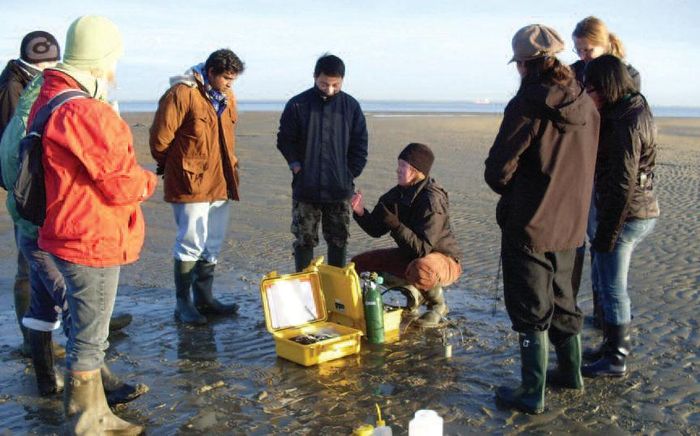Erasmus Mundus Master of Science in Marine Biodiversity and Conservation
During the lifetime of MarBEF the idea arose of establishing a specialised Master’s programme, the Erasmus Mundus Master of Science in Marine Biodiversity and Conservation (EMBC)[1]. This programma is no longer running and replaced by the programme International Master of Science in Marine Biological Resources.
Participation institutes
The course involves six European universities Ghent University (Belgium), which coordinates the whole programme; University of Bremen (Germany); University of the Algarve (Portugal); University Pierre et Marie Curie - Paris 006 (France); University of Oviedo (Spain), and University of Klaipèda (Lithuania)). In addition to these six universities which already have close relations with MarBEF, it was decided to also include the other MarBEF institutes, where possible, in the programme. In this way, research and education can go hand in hand. MarBEF institutes can, for example, offer thesis subjects, offer summer schools and take part in specialised courses. European Union funding has also facilitated the participation of students from outside the Europe Union[1].
The program
The programme has been divided into a series of thematic modules, each containing a number of specialised courses:
- Understanding the structure and function of marine biodiversity
- Toolbox for investigating marine biodiversity
- Conservation and restoration of marine biodiversity
Students must take courses from each of these 3 modules and develop a study curriculum which best fits their interests. A key feature of the Master’s programme is that the students are obliged to be mobile, i.e., all students have to move between universities during their two-year Master’s programme. After a first year in either Ghent, Bremen or Algarve, they move to Paris, Oviedo or Klaipeda. In between, they have to take some 3 extra summer school courses, and for their last semester (dedicated to thesis work), they can move again to one of the six universities or to a MarBEF institute. In this way, students learn how networking in a European context really works, and they are able to gather experiences in different European countries[1].

References
- ↑ 1.0 1.1 1.2 Heip, C., Hummel, H., van Avesaath, P., Appeltans, W., Arvanitidis, C., Aspden, R., Austen, M., Boero, F., Bouma, TJ., Boxshall, G., Buchholz, F., Crowe, T., Delaney, A., Deprez, T., Emblow, C., Feral, JP., Gasol, JM., Gooday, A., Harder, J., Ianora, A., Kraberg, A., Mackenzie, B., Ojaveer, H., Paterson, D., Rumohr, H., Schiedek, D., Sokolowski, A., Somerfield, P., Sousa Pinto, I., Vincx, M., Węsławski, JM., Nash, R. (2009). Marine Biodiversity and Ecosystem Functioning. Printbase, Dublin, Ireland ISSN 2009-2539